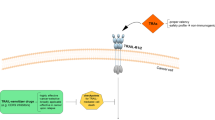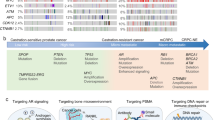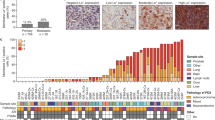Abstract
We present the involvement and association of TNF‐related apoptosis‐inducing ligand (TRAIL) with apoptosis. Its potential application as a therapeutic agent in urologic oncology is discussed. We have examined the sensitivity of prostate carcinoma cell lines DU145, PC3 and LNCaP to TRAIL‐induced apoptosis and the expression of TRAIL receptors. Furthermore we looked into the sensitization of those prostate carcinoma cell lines to TRAIL‐mediated apoptosis by low toxic levels of actinomycin‐D. Furthermore, we review and discuss the pertinent literature on the molecular biology of TRAIL, its receptors and future potential for therapy in urologic oncology.
Recent discovery and characterization of TRAIL has led to further broadening and insights into the apoptotic process. Based on preceding in‐vitro studies, the first in-vivo study using TRAIL has been conducted and published in 1999. Systemic application of TRAIL in severe combined immune deficient (SCID) mice resulted in tumor regression of subcutaneous implanted mammary and colon cancer and several groups are looking into TRAIL sensitivity of prostate cancer and renal cancer cellines. Our in-vitro data revealed a significant increase of apoptotic cell death rate following the combined application of TRAIL with actinomycin‐D.
Our results suggest that the combination of TRAIL and ActD may be a therapeutic option in the treatment of drug/hormone refractory prostate carcinoma. In the future TRAIL may be used in combination therapy with other immunotherapies or gene therapies providing a synergistic effect or enhancing the efficacy of chemotherapeutic or radiotherapeutic regimens.
This is a preview of subscription content, access via your institution
Access options
Subscribe to this journal
Receive 4 print issues and online access
$259.00 per year
only $64.75 per issue
Buy this article
- Purchase on Springer Link
- Instant access to full article PDF
Prices may be subject to local taxes which are calculated during checkout
Similar content being viewed by others
Author information
Authors and Affiliations
Corresponding author
Rights and permissions
About this article
Cite this article
van Ophoven, A., Ng, C., Patel, B. et al. Tumor necrosis factor‐related apoptosis‐inducing ligand (TRAIL) for treatment of prostate cancer: first results and review of the literature. Prostate Cancer Prostatic Dis 2, 227–233 (1999). https://doi.org/10.1038/sj.pcan.4500373
Received:
Revised:
Accepted:
Published:
Issue Date:
DOI: https://doi.org/10.1038/sj.pcan.4500373
Keywords
This article is cited by
-
In vivo and in vitro evaluation of effects of Mg-6Zn alloy on apoptosis of common bile duct epithelial cell
BioMetals (2014)
-
Targeted induction of apoptosis via TRAIL and cryoablation: a novel strategy for the treatment of prostate cancer
Prostate Cancer and Prostatic Diseases (2007)
-
Death receptor 4 (DR4) efficiently kills breast cancer cells irrespective of their sensitivity to tumor necrosis factor-related apoptosis-inducing ligand (TRAIL)
Cancer Gene Therapy (2004)



